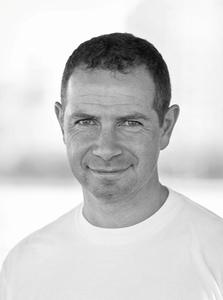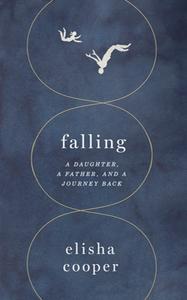
|
|
| photo: Christopher Smith | |
Elisha Cooper is the author and illustrator of the picture books Train, Farm, Homer and, most recently, 8: An Animal Alphabet. Beach won the 2006 Society of Illustrators Gold Medal, and Dance! was a New York Times Best Illustrated Book of the Year. His adult titles include A Year in New York and the memoir Crawling: A Father's First Year. Cooper's second memoir, Falling: A Daughter, a Father, and a Journey Back (Pantheon, June 14, 2016) explores his family's experiences after his older daughter, Zoë, was diagnosed with cancer. Cooper lives with his family in New York City.
Falling is a memoir about a frightening time in your family's life: the story of your daughter Zoë's struggle with cancer. How and why did you decide to write this story?
I think writers write about their lives and their families. I knew I needed to write about this eventually. I didn't really take any notes during it--not while we were in the middle of it. But once Zoë was out of treatment, I wanted to think about the process.
I wanted to ask questions about cancer and this whole process--not simply "How did we get through it?" but "How do things like humor still work in the face of cancer?" I mean, writers write. I've always had a sketchbook; I've always carried a notebook around. I believe we figure things out by writing, and I thought: if I can write about this, if I can share what I've learned, maybe I can help another parent who's going through something similar.
How did your wife and daughters, especially Zoë, react to being the subject of this book?
Well, I asked their permission before I wrote it. I wanted to be very respectful of their stories. I love these three girls--women--completely, and while this is something that happened to me, it's also something that happened to my daughter and our family. I wanted to respect that.
I ended up reading it aloud to them during the editing process. I'd be sitting on the couch reading an essay aloud, and Zoë and Mia (my younger daughter) would interrupt me and roll their eyes and say, "That's not how it happened!" So it was also a really funny, warm process. I had no problem writing in a negative way about other people outside our family--for example, one particular doctor who made me furious. But as far as my wife and daughters are concerned, I wanted it to be a celebration of them, of our family and how we made it through this thing.  How did it feel to write about such a traumatic experience?
How did it feel to write about such a traumatic experience?
I was obviously very scared for Zoë, but the whole process also made me very angry at times. I was furious and worried. And I wondered about that: Why was I so angry? That's one reason I wanted to write about this, to figure that out. I think one part of it has to do with being a writer: we use words and we control things. We control what we put on paper. And we could not control this at all.
I think this story is bigger than my daughter, though. It's more about dealing with any big, scary thing: What do you do when sh*t happens? I don't know. Other people might have other ways of getting through it. But this is my story. I want to share how we got through it.
Alongside the narrative of cancer in the book, there's a narrative of wanting to teach your daughters to take risks.
I think there's this idea in our society that girls are protected, or ought to be protected--that they should do certain things, wear certain things. And also that they can't do certain things. And I didn't want that. I wanted my girls to feel like the world is out there for the taking.
So Zoë breaks her wrist (in the book) and you're glad--because that's part of childhood. It's part of climbing trees and riding bikes, taking risks.
Yes. I think going out and getting a little bloody--scraped knees, broken bones--is part of it. I wanted my girls to take risks. I'm a feminist, and I want them to seize the world. And they do. They're amazing. Zoë is trying out for high school soccer, and part of what I feel when I see her play is unadulterated love for her and her strength. I would love watching her play regardless--even if we'd never gone through this--but there's a deeper level of joy to it all, after the cancer.
Your usual artistic medium is picture books. Was it difficult to switch to another mode for this book?
I love writing picture books because the words and art work together. I'm an artist, too, and I always carry a sketchbook. But, of course, there's no art in this book, except the cover. It's very different--it's really its own thing.
Usually, when I'm writing a picture book, I spend a lot of time in cafes, sketching on park benches, that kind of thing. While I was writing this book, I spent a ton of time at the Ace Hotel lobby uptown, which is a very dark space with all these hipsters. It was a public space, but very dim--I could go there and be alone with words. This is a much more internal book than some of my others, and I spent a lot of time sitting alone in the dark and playing with words.
The title, Falling, resonates on several levels.
The way I pictured it initially was that Zoë "fell"--that is, she got sick--and she got better pretty quickly. She recovered physically, and was able to move on emotionally. But I didn't. I had to spend years working through this. I think sometimes for witnesses--for people who are watching someone they love go through illness or pain--it's harder than it is for the person who's actually sick or suffering. You fall, and it takes a while to get back up. So on the book cover, there's an image of a father and daughter in the air. And it's like I'm trying to catch her and I'm sort of unable to do that. But she's flying.
The moments when Zoë was going in for her scans, when I was sitting next to her in that hospital room, may have been the worst of my life. I could feel the world opening up beneath me. And, oddly, it was those moments that made me want to write about it.
It's almost a cliché, because [the musical] Hamilton is everywhere at the moment--but both my daughters are big fans. And there's a line in the musical about how Hamilton wrote his way out of hell. I wrote my way out of this, in a sense. --Katie Noah Gibson, blogger at Cakes, Tea and Dreams

